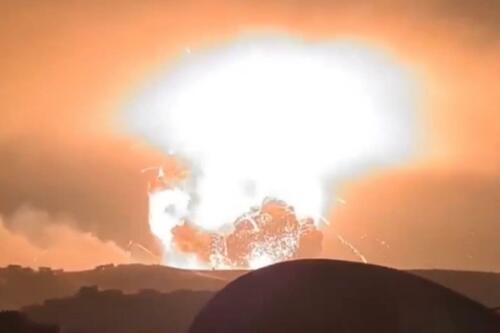Days ago Israel began warning that it will use large bunker buster munitions to begin destroying the former Syrian Army's underground missile and weapons storehouses.
This has begun in the overnight hours, with Israeli warplanes pummeling air defense systems and ammunition depots in Damascus and the coastal city of Tartous, near where a Russian naval base is located. The strike on Tartous resulted in the single biggest explosion seen in Syria in years, unleashing a fireball and mushroom cloud so large it led to quick speculation it could have been a tactical nuke (which widespread reports are denying).
Israel hit an arms depot in Bmalkeh, #Syria, a town some klm above Tartus.
— Joshua Landis (@joshua_landis) December 16, 2024
Windows in the entire region were broken. We don’t know how many dead. pic.twitter.com/RllrIwhXCd
The London-based Syrian Observatory for Human Rights (SOHR) described that Israeli warplanes hit air defense units and "surface-to-surface missile depots" as part of a bid to degrade and disable Syria's military capability. SOHR also called it the "the heaviest strikes" on the region in over a decade.
The Telegraph wrote that "A 3.1 magnitude tremor was reported by the Geographic Survey of Israel’s seismology department at 11.49pm on Sunday night in the region of the bombings."
"The explosions in Tartous were extremely loud," Al Jazeera’s Resul Serdar, reporting from inside the country, additionally described. "Some experts are saying that might probably mean it was a chemical weapons production house."
Other sites which were bombed overnight were radar and air defense systems outside of Damascus, around the Qaisioun mountain which dominates the background of the capital.
In total there have been an estimated 600 Israeli strikes over the course of eight days. Some of them began immediately upon Hayat Tahrir al-Sham (HTS) entering the environs of Damascus as President Assad fled the country.
An Israeli broadcast correspondent from Kann previously wrote that "An Israeli source tells me: Israel's goal is to destroy everything from Assad's army that could fall into the hands of the rebels - from tanks to missiles. We are destroying the equipment of the Assad army."
A Massive Explosion seen in Northwestern Syria near the City of Tartus, following an Israeli Strike against a Munitions Depot; with the Explosion reported to have been so large, that it measured as a 3.0 Magnitude Earthquake on nearby Seismic Sensors. pic.twitter.com/i1jC1vNjVJ
— OSINTdefender (@sentdefender) December 15, 2024
Jets and aerial equipment, and runways at bases are being obliterated. Part of Israel's aim also seems to be preventing pro-Iranian entities from ever popping up again in Syria, and to finally and definitively dismantle Hezbollah and Shia militias' arms networks. It's also unclear what kind of future government will dominate Syria - most likely a hardline Sunni one.
Days ago Israel began warning that it will use large bunker buster munitions to begin destroying the former Syrian Army's underground missile and weapons storehouses.
This has begun in the overnight hours, with Israeli warplanes pummeling air defense systems and ammunition depots in Damascus and the coastal city of Tartous, near where a Russian naval base is located. The strike on Tartous resulted in the single biggest explosion seen in Syria in years, unleashing a fireball and mushroom cloud so large it led to quick speculation it could have been a tactical nuke (which widespread reports are denying).
Israel hit an arms depot in Bmalkeh, #Syria, a town some klm above Tartus.
— Joshua Landis (@joshua_landis) December 16, 2024
Windows in the entire region were broken. We don’t know how many dead. pic.twitter.com/RllrIwhXCd
The London-based Syrian Observatory for Human Rights (SOHR) described that Israeli warplanes hit air defense units and "surface-to-surface missile depots" as part of a bid to degrade and disable Syria's military capability. SOHR also called it the "the heaviest strikes" on the region in over a decade.
The Telegraph wrote that "A 3.1 magnitude tremor was reported by the Geographic Survey of Israel’s seismology department at 11.49pm on Sunday night in the region of the bombings."
"The explosions in Tartous were extremely loud," Al Jazeera’s Resul Serdar, reporting from inside the country, additionally described. "Some experts are saying that might probably mean it was a chemical weapons production house."
Other sites which were bombed overnight were radar and air defense systems outside of Damascus, around the Qaisioun mountain which dominates the background of the capital.
In total there have been an estimated 600 Israeli strikes over the course of eight days. Some of them began immediately upon Hayat Tahrir al-Sham (HTS) entering the environs of Damascus as President Assad fled the country.
An Israeli broadcast correspondent from Kann previously wrote that "An Israeli source tells me: Israel's goal is to destroy everything from Assad's army that could fall into the hands of the rebels - from tanks to missiles. We are destroying the equipment of the Assad army."
A Massive Explosion seen in Northwestern Syria near the City of Tartus, following an Israeli Strike against a Munitions Depot; with the Explosion reported to have been so large, that it measured as a 3.0 Magnitude Earthquake on nearby Seismic Sensors. pic.twitter.com/i1jC1vNjVJ
— OSINTdefender (@sentdefender) December 15, 2024
Jets and aerial equipment, and runways at bases are being obliterated. Part of Israel's aim also seems to be preventing pro-Iranian entities from ever popping up again in Syria, and to finally and definitively dismantle Hezbollah and Shia militias' arms networks. It's also unclear what kind of future government will dominate Syria - most likely a hardline Sunni one.

